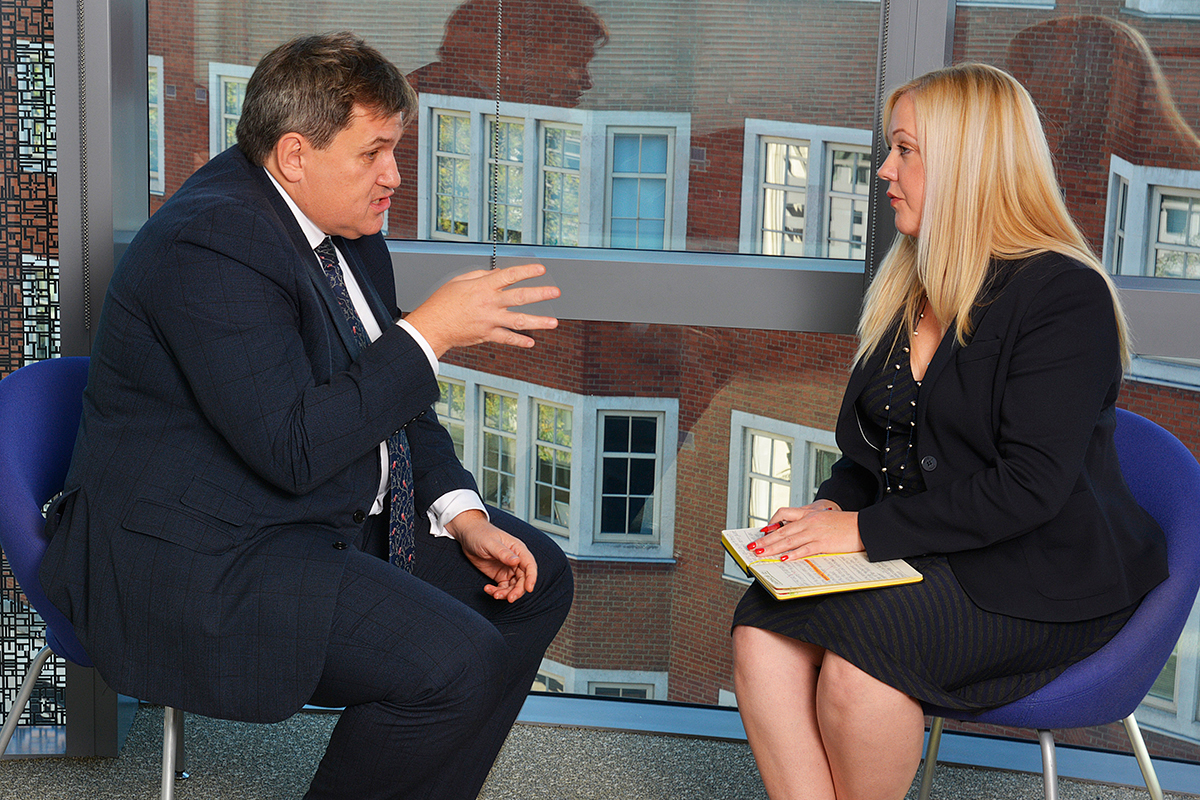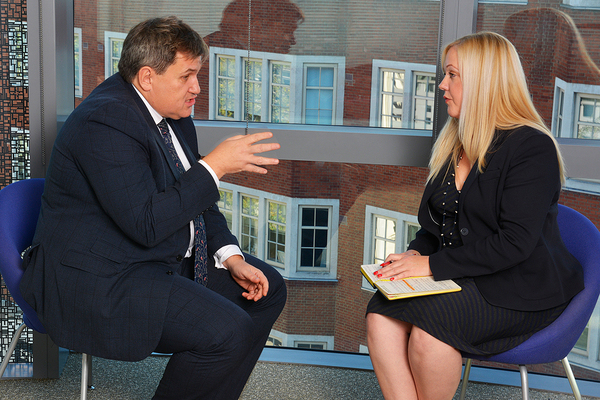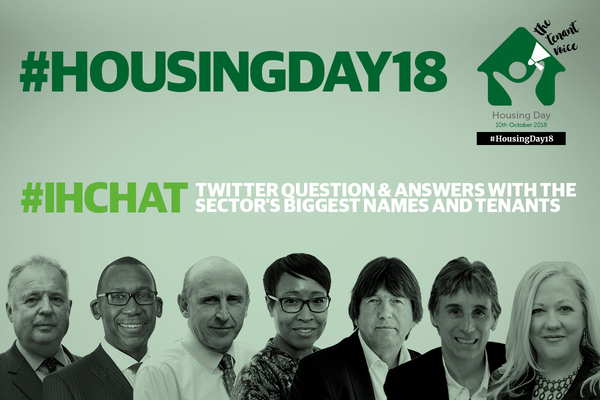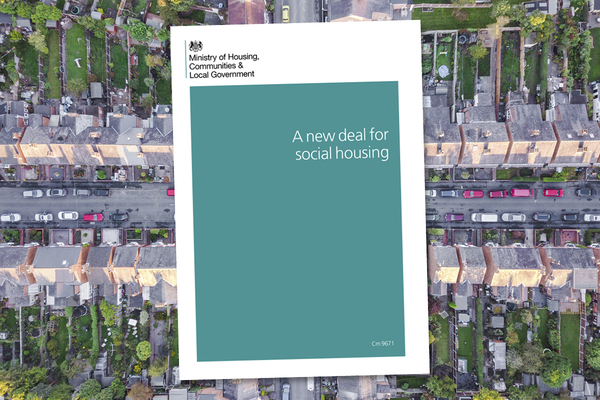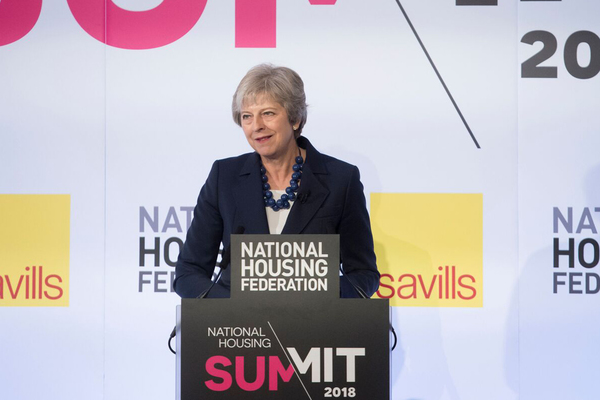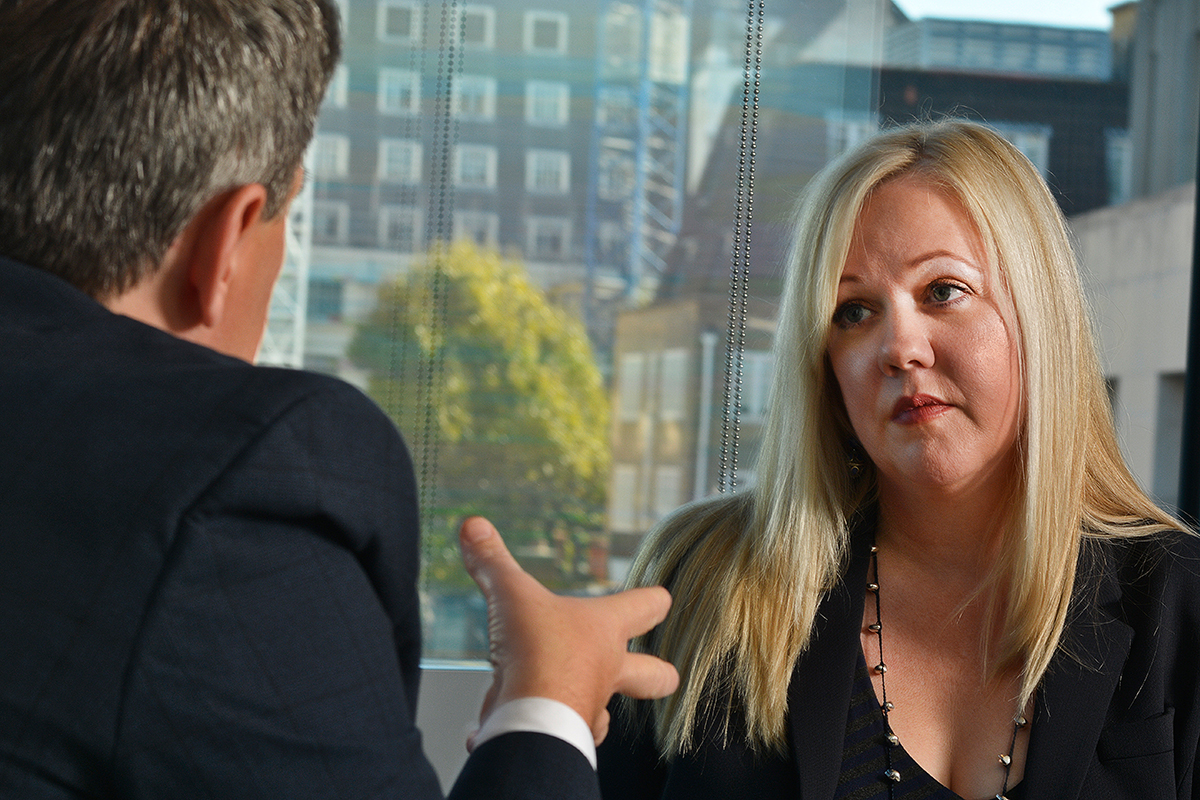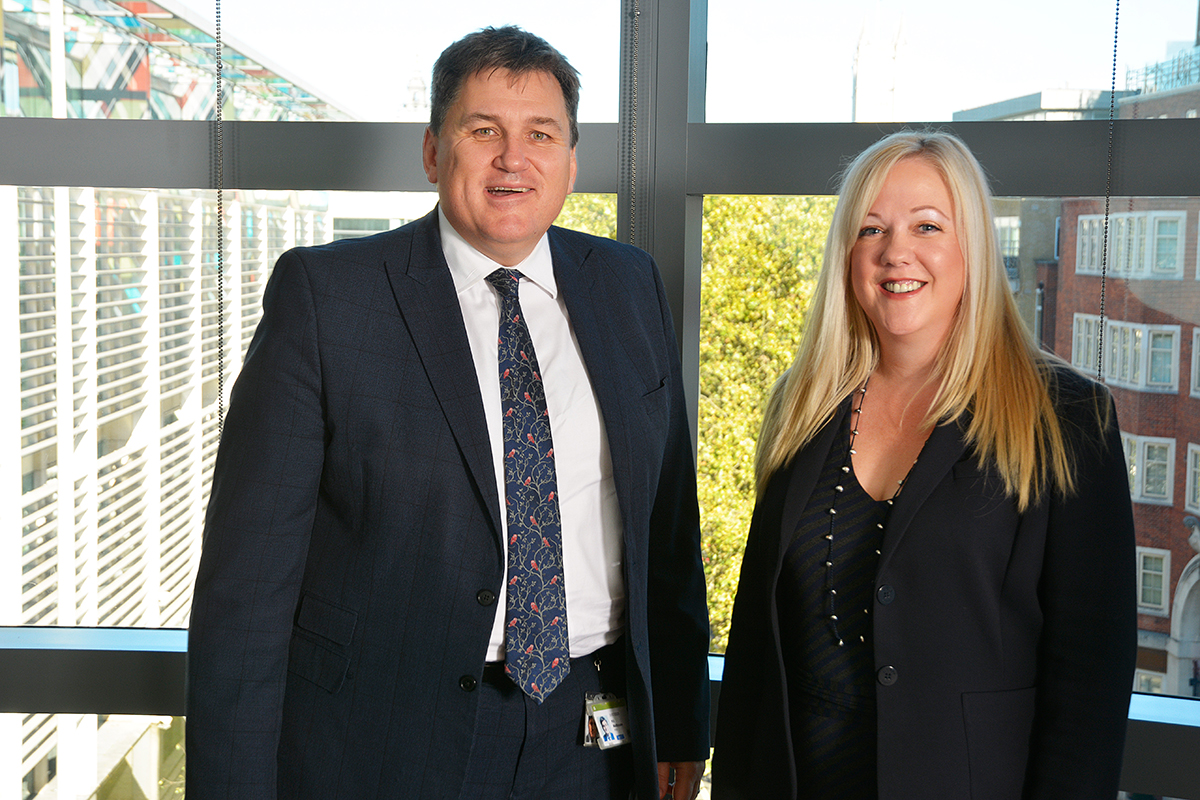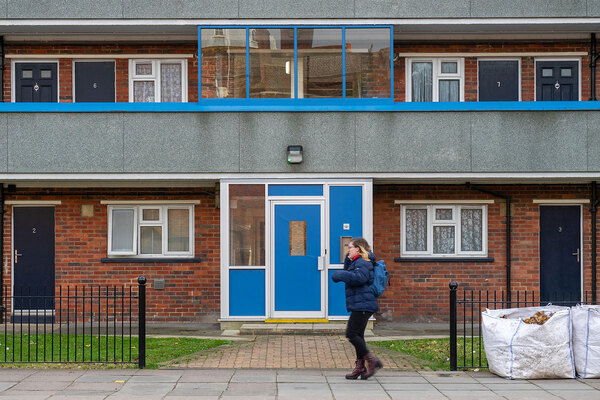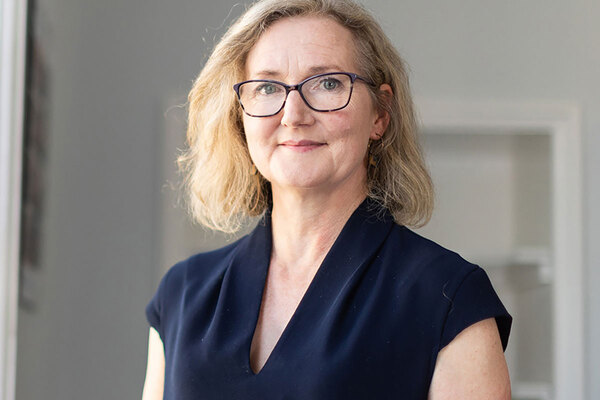The big Housing Day interview: Kit Malthouse is grilled by Leslie Channon
Housing minister Kit Malthouse met with Housing Day organiser and Cottsway tenant Leslie Channon to talk about a voice for tenants, welfare reform and what the government has in store for social landlords. Martin Hilditch observed. Pictures by John Robertson.
Back in August the Social Housing Green Paper highlighted tenants’ desire for “a culture of accountability” and government’s own goal of “making sure their voices are heard”.
Ahead of this year’s Housing Day – which has ‘the tenant voice’ as its theme – new housing minister Kit Malthouse was asked to put his money where his mouth is by organiser Leslie Channon.
Given the government’s call for greater accountability, it was probably a request he couldn’t refuse. So, with barely 12 hours until the start of Housing Day, Mr Malthouse met up with Ms Channon in his spacious corner office at the Ministry of Housing, Communities and Local Government (MHCLG).
Apart from organising this year’s event, Ms Channon is a Cottsway tenant, who chairs the A Voice for Tenants steering group, which is seeking to establish a national body in England to speak on behalf of social housing tenants.
She is also a lead steering group member of the Benefit to Society campaign, which aims to tackle stereotyping of social tenants, board member at TPAS and has just started a new job as the insight lead at HACT.
Inside Housing had exclusive, fly-on-the-wall access to the interview which covered everything from how to make sure landlords better empower tenants to fire safety, welfare reform and what plans, if any, the government has to establish a national voice for tenants.
They sit facing each other, Ms Channon leaning forward and jabbing the air with her red pen as she asks questions and Mr Malthouse unleashing his politician’s arsenal of expansive hand gestures to punctuate his remarks.
So what emerged from the interview and just how open did Mr Malthouse prove to be?
We’ll start with the tenant voice, given that is the broad theme of housing day, and also a bit of a grey area when it comes to the government’s plans.
As a reminder, the green paper acknowledged that a number of tenant and resident organisations were keen on “an independent platform for tenants”. It then asked “is there a need for strong representation for residents at a national level” and “if so, how should this best be achieved?”. (Consultation on the green paper runs until 6 November for anyone who wants to guide the government’s thinking in this area).
Ms Channon asks directly what Mr Malthouse’s personal feelings are about the idea. He starts by outlining some of the key questions he feels any national voice would need to address, such as “how do you cover the whole country?” and “how does everybody feel that it is theirs without having some massive bureaucracy of elections and all the rest of it?”. He doesn’t sound keen on an elected body – which is certainly what some tenants have been calling for – stating “if it is elections, people run on tickets and it all gets a bit bureaucratic and difficult”.
What the government wants from a tenants’ voice is “something that is raw and real” he states. “Real time” feedback on issues is important, he adds. The government is open to ideas about whether there should be a national or regional structure, he says, pondering whether an annual conference – along the lines of the annual party conferences – might work, but repeats time and again that “I don’t know – I’m open to ideas”.
“What do you think?” he asks Ms Channon. Ms Channon responds that “what I think is kind of irrelevant” because she doesn’t represent the feelings of the body of tenants nationally.
“It became clear after the awful Grenfell tragedy that quite a lot of people in social housing didn’t feel that they were being listened to,” the minister states
But she says that what the Voice for Tenants group wants is backing from government that would enable a feasibility study to be carried out “to temperature check the eight million people in social housing and ask them ‘what do you want?’ and come back with some kind of idea of how that is going to be set up”.
The most important thing about any process must be to consult widely, she adds.
One of the first questions Ms Channon asks on the day is just why the voice of social housing tenants is important to the government.
“It became clear after the awful Grenfell tragedy that quite a lot of people in social housing didn’t feel that they were being listened to,” the minister states. “That either they were screaming into the void and not being responded to, or that politicians over the last couple of decades have stopped caring.”
Mr Malthouse is candid that this is an issue for government to look at itself about, too.
“It’s very important,” he states. “You know, most constituency MPs, the good ones, try and maintain a constant conversation with their constituents. You do that through letters and emails and surgeries and all the rest of it. It’s very important that you are responsive to and sensitive to your constituency.
“But collectively, maybe government had stopped doing that with particular constituencies, one of which – a huge one with four point something million homes – was social housing tenants. They felt that and certainly now we felt that and hopefully we are correcting it.”
If government is looking to change, Ms Channon wants to know what the plan is for those landlords who are “barely complying with the [English regulator’s] tenant involvement and empowerment standard”.
Mr Malthouse says that a theme that has emerged from some of his meetings with tenants so far is a feeling that “they were being excluded at the highest level”. “They felt as if particular boards were hiving them off into sub-committees”, or that tenant participation was an “afterthought, tick-the-box thing”, he adds, although he says he doesn’t think this is necessarily the case for most landlords.
It’s very important that you are responsive to and sensitive to your constituency.
But collectively, maybe government had stopped doing that with particular constituencies, one of which was social housing tenants.
There is however, a “democratic challenge” for social landlords to address about how tenants are selected to sit on boards or senior governance positions, he feels (a common complaint from some residents is that tenant positions on boards and committees are often unelected – meaning that even when there are resident board members, many other tenants can be left feeling disenfranchised and powerless).
More widely for social landlords, one of the key questions the government is asking is “how do we swing the pendulum a bit towards the consumer-facing regulations so that they sharpen up their act” when it comes to responding to tenant complaints, he adds.
This is a topic that Mr Malthouse returns to again a little later when Ms Channon raises the issue of welfare reform – one of the top three issues in those tenant meetings with government in the run up to the green paper, she states. “Will your department be encouraging others within government to look again at how tenants are treated?” she asks. They’re speaking just hours before former prime minister Gordon Brown wades into the debate too, calling on government to abandon the roll-out of the “cruel and vindictive” Universal Credit.
As a former Department for Work and Pensions minister, Mr Malthouse knows the issue well and sticks firmly to the line that “Universal Credit holds enormous promise”.
Paying benefit direct to tenants rather than their social landlords means both think more carefully about the “purchaser/provider relationship”, he states.
Mr Malthouse says he thinks that some social landlords had become “less responsive” to tenant needs because “there was no direct commercial relationship” with them. “Reconnecting people with that relationship I think is going to bring big changes in the social rented sector”, he adds, stating that previously “when I have been a renter in the private rented sector in the past and when I am paying over the rent, I’m buying a service and I was a demanding tenant and my landlord needs to be responsive to me, otherwise there is a possibility I may not pay, or there might be a dispute”.
Click here for more on #IHchat on Housing Day
“So, allowing people to take responsibility and have that power that they are the purchaser direct, could be quite powerful for them,” he adds, although he doesn’t mention quite where else tenants unhappy with social landlords might take their business.
Ms Channon also asks Mr Malthouse what he would say to tenants living in high-rise blocks who are fearful for their safety following Grenfell.
Mr Malthouse refers to Basingstoke MP Maria Miller, who earlier this year introduced a bill to parliament – the Fire Safety Information Bill – which would have required high-rise residents to be provided with more information about the fire safety of their buildings and to have access to their fire risk assessments (something Inside Housing has been calling for for a year in its Never Again campaign).
She withdrew the bill after a meeting with Mr Malthouse last month who tells Ms Channon that some of Ms Miller’s thinking could be “woven into” the government’s plans for building owners.
“One of the areas in the green paper that is intrinsic to the discussion is about what more we can do from the regulatory and information point of view to make sure that residents feel safe,” he adds.
The government has also pledged to address the stigmatisation of social housing – but how is it planning to do this, Ms Channon asks.
“The secretary of state has said ‘why don’t we view it like the NHS, why don’t we see it as this jewel that we all treasure?’”, Mr Malthouse states.
“We’re asking for ideas,” he adds. “I’m not sure myself. It would be great, wouldn’t it, if it was your preference to live on a social housing estate because it was beautifully maintained and looks fantastic. We want it to be something that is aspirational”.
All of which suggests there is some way for the government to travel. But at least it is open to ideas and suggestions – and, of course, the Social Housing Green Paper is still out for consultation. The interview over, Ms Channon states that she was impressed that the minister answered her questions directly and that he was clearly interested in more feedback from tenants moving forward.
On a Housing Day that celebrates the tenant voice, of course, one big question remains – what, if anything, will government do to give tenants a bigger input on the national and regional stage moving forwards? By next year’s Housing Day we will have the answer – and then it will be time for round two between Mr Malthouse and Ms Channon.
#IHchat programme on #HousingDay18
Inside Housing's #IHchat programme of Twitter Q&As for Housing Day on Wednesday, 10 October:
8am – 8.45 Introduction to #HousingDay18
- Leslie Channon, #HousingDay18 organiser and tenant of Cottsway Housing Association @LeslieChannon
Chair: Carl Brown, Inside Housing
9am - 9.45am How do we strengthen the tenant voice?
- Terrie Alafat , chief executive, Chartered Institute of Housing @TerrieAlafatCIH
- Nic Bliss, head of policy, Confederation of Co-operative Housing @nicblisscch
- Sharon Hayward, co-ordinator, London Tenants Federation @Londontenants
- Catherine Little, executive housing director, Broadland Housing Group @Catherine_BHG
- Louise Thompson, head of business services, Tpas @tpasLouise
Chair: Martin Hilditch, Inside Housing
10am - 10.45am The challenge for councils
- Lord Porter, chair of the Local Government Association @garyporterlga
- Joanne Roney, chief executive, Manchester City Council @joanneroney
Chair: Nathaniel Barker, Inside Housing
11am - 11.45am Improving services for residents
- Nick Atkin, chief executive, Halton Housing Trust @nickatkin_hh
- Oliver Harling, voids supervisor, ForWorks, tenant and winner of Rising Stars 2018 @oliverharling_h
- Amy Nettleton, assistant development director sales and marketing, Aster Group @amynettleton1
- Boris Worrall, chief executive, Rooftop Housing Group @BorisJWorrall
Chair: Luke Barratt, Inside Housing
12am - 12.45am Inclusive Futures
- Steve Douglas, co-chief executive, Altair @Steve_Altair
- Elly Hoult, programme director, Notting Hill Genesis @HoultElly
- Tom Murtha, former housing association chief executive and campaigner @tomemurtha
Chair: Emma Maier, Inside Housing
1pm – 1.45am How do we combat stigma?
- Rachel Broady, journalist and author of Fair Press for Tenants @RachelBroady
- Victoria Dingle, tenant board member, Soha Housing @victoria_dingle
- Michael Newey, chief executive, Broadland Housing Group @MichaelNeweyBHG
- Paul Taylor, innovation coach, Bromford @PaulBromford
Chair: Carl Brown, Inside Housing
2pm - 3pm Creating social value through job creation (sponsored by LHC)
- Mark Henderson , chief executive, Home Group @MarkGHenderson
- Geraldine Howley, chief executive, Incommunities
- Nigel Williams, chief commerical officer, LHC @LHCprocurement
Chair: Maria Shahid, Inside Housing
3.30pm - 4.15pm Housing and Labour
- John Healey, shadow housing secretary @JohnHealey_MP
Chair: Pete Apps, Inside Housing
4.30pm - 5.15pm Combatting homelessness, hunger and poverty
- Beatrice Orchard, head of policy, campaigns and research, St Mungo’s @BeaOrchard
- Mike Owen, chief executive, Merthyr Valleys Homes @MikeOwen2390
- Brian Robson, acting head of policy and research, Joseph Rowntree Foundation @jrfbrian
Chair: Nathaniel Barker, Inside Housing
5.30pm - 6.15pm How do we build the right homes in the right places?
- Sheron Carter, chief executive, Habinteg @CarterSheron
- David Cowans, chief executive, Places for People @david_cowans
- James Murray, deputy mayor for housing and residential development, Greater London Authority @jamesmurray_ldn
- James Prestwich, head of policy, National Housing Federation @JamesAPrestwich
- Barbara Spicer, chief executive, Plus Dane @BarbaraSpicer15
Chair: Luke Barratt, Inside Housing
